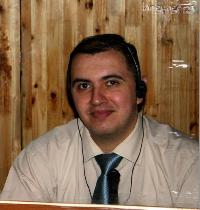| Pages in topic: < [1 2 3] > | How to learn simultaneous interpreting - suggestions needed Thread poster: Luke Mersh
|
|---|
Williamson 
United Kingdom
Local time: 12:56
Flemish to English
+ ...
| Speaches by heads of State. | Jul 31, 2011 |
Speaches by Sarkozy, Obama, Zapatero, Merkel are good practise material. Sarkozy pauses after every sentence and looks at his audience, Obama is very articulate, Zapatero and Merkel too.
I often watch France24 in both English and French. I also watch TVE internacional, where speeches of imporant events are interpreted simultaneously. The E.P. has a speech repository.
| | | | Luke Mersh 
United Kingdom
Local time: 12:56
Spanish to English
TOPIC STARTER | how to learn simultaneous interpreting | Jul 31, 2011 |
sounds like good ideas.
i find that when i try to interpret at the same time i tend to loose parts of the conversation because i try to translate in my mind and therefore fall behind with the speech.
Or i am not fast enough speak at the same time.
| | | | Luke Mersh 
United Kingdom
Local time: 12:56
Spanish to English
TOPIC STARTER | Simultaneous shadow speaking | Aug 17, 2011 |
So i had my first lesson today at practising shadow speaking in the same language, which my tutor thought would be better than trying to translate the speech first.
I found it difficult at first and was mumbling at the beginning, but progressively getting clearer as we went on.
the speech's are only about a minute and a half long, all to do with medical thing and in Spanish, obviously the more i listened to the speech the more i remembered of it.
I am hoping someb... See more So i had my first lesson today at practising shadow speaking in the same language, which my tutor thought would be better than trying to translate the speech first.
I found it difficult at first and was mumbling at the beginning, but progressively getting clearer as we went on.
the speech's are only about a minute and a half long, all to do with medical thing and in Spanish, obviously the more i listened to the speech the more i remembered of it.
I am hoping somebody could assist me with techniques or a system to practice for learning to shadow speak.
regards
luke ▲ Collapse
| | | | | Shadow speaking for language learners (and interpreters) | Aug 17, 2011 |
Luke,
The most systematic description of shadow speaking that I ever encountered was by Alexander Arguilles, a polyglot who uses this technique to master pronunciation in foreign languages. On his website, he gives a fairly good description of the process:
http://foreignlanguageexpertise.com/foreign_language_study.html#svd
He adds ... See more Luke,
The most systematic description of shadow speaking that I ever encountered was by Alexander Arguilles, a polyglot who uses this technique to master pronunciation in foreign languages. On his website, he gives a fairly good description of the process:
http://foreignlanguageexpertise.com/foreign_language_study.html#svd
He adds a physical element to "shadowing", which may or may not work for you. (Possible) hype and pretension aside, his instructions can be quite useful. He also made some Youtube videos of his shadowing technique, in case you want a more visual demonstration.
Hope this helps.
Marina ▲ Collapse
| | |
|
|
|
Luke Mersh 
United Kingdom
Local time: 12:56
Spanish to English
TOPIC STARTER | shadow speaking | Aug 17, 2011 |
Hi there
thanks for that quick reply will study that in detail and see if it helps me.
[Edited at 2011-08-17 15:29 GMT]
| | | | Luke Mersh 
United Kingdom
Local time: 12:56
Spanish to English
TOPIC STARTER | how to learn simultaneous interpreting | Aug 21, 2011 |
this shadow speaking is really difficult.
I tried to record my voice, i was mumbling a lot.
| | | | Luke Mersh 
United Kingdom
Local time: 12:56
Spanish to English
TOPIC STARTER | how to learn simultaneous interpreting | Aug 22, 2011 |
How does somebody learn to shadow speak when they dont know what is going to be said next, i guess thats the art in it.
but i would be grateful for any ideas because it sure is difficult.
| | | | | Concentration, concetration, and once more - concentration. | Sep 3, 2011 |
luke_cbs wrote:
I am shadowing in Spanish not English , English is my native tongue, but as i am training to be an interpreter of English and Spanish I need to be able to simultaneously interpret from Spanish to English.
I agree with my brethren: it's always best to start learning simultaneous interpretation in your native language and then as you progress and gain confidence, you can proceed to the target language.
That being said, as an aside, I would like to make a general note. There are two major types of languages out there: synthetic and agglutinative ones.
While most of the Western world is mainly Latin(synthetic) language based, which is basically easy to interpret simultaneously as you don't have to remember the entire sentence and can pretty much go word-by-word (not in the sense of literal interpretation, but rather pace).
Then there are languages like Hungarian, Turkish, Finnish, Japanese, etc., which are agglutinative. It basically means that you take a base root form (or stem) of a word, and slightly modify its meaning by adding one or several sub-endings. Depending on the number of endings, a word may look like a train-engine with a number of cars attached to it, which may alter its meaning to a signifiant degree. You can find more info on them here: http://en.wikipedia.org/wiki/Morphological_typology
Now the problem with the agglutinative languages that not so many people know is that the main verb expressing the core action in the sentence is ALWAYS at the end. So, if you interpret from Finnish, Hungarian, Japanese etc., and you just heard main speaker say something like in their language: "From the crisis of 2008 the economy of the country is going to rebound, the President of the United States his confidence expressed", then you would have to wait and listen all the way to the end of the entire sentence in order to make sure you heard and understood the very last verb, or the meaning of the structure may be misinterpreted: "The President of the United States expressed his confidence that the economy of the country is going to rebound from the crisis of 2008."
I am originally from Azerbaijan, and Azerbaijani language is closely related to Turkish. While Turkish is a relatively modern language and their government has modified it over the years, trying to make it more "western", its Azerbaijani, or Azeri 'cousin' still sounds kind of like, what you'd call King James English, to Turks.
It is one of the most reversed languages I've ever known. We conducted trainings for interpreters into the Azeri language, teaching them to lag behind and memorize the leading sentense, and then listen to the second sentense, while having translated the first one. It requires a degree of concentration to which many of us are unused. But still it is possible to master interpretation even in these conditions.
Go for it, and good luck!
Teymur
| | |
|
|
|
Phil Hand 
China
Local time: 19:56
Chinese to English
1) Shadowing is a technique used to improve your control over your voice. It's not an end in itself. No-one needs a Spanish-Spanish simultaneous interpreter. So don't think about "learning how to do it". Think about how this exercise can benefit your interpreting. Try to concentrate on producing audible, coherent sentences.
That said, the guy who taught me didn't teach shadowing. It's not got much to do with interpreting.
2) Predicting. This is a question of experience. There... See more 1) Shadowing is a technique used to improve your control over your voice. It's not an end in itself. No-one needs a Spanish-Spanish simultaneous interpreter. So don't think about "learning how to do it". Think about how this exercise can benefit your interpreting. Try to concentrate on producing audible, coherent sentences.
That said, the guy who taught me didn't teach shadowing. It's not got much to do with interpreting.
2) Predicting. This is a question of experience. There are lots and lots of things in a sentence that tell you what's coming next. The example everyone learns in week one is this:
The xxxx has brought enormous opportunities, but it has also ....................
The word "challenges" should leap to your mind. This is a really hoary staple of public speaking, and it crops up over and over and over again. How does one learn these? By interpreting about a million speeches. There's no trick here, no knack. You just have to sit down and grind out the hours of practice.
Good luck! ▲ Collapse
| | | | Luke Mersh 
United Kingdom
Local time: 12:56
Spanish to English
TOPIC STARTER | How to learn simultaneous interpreting - suggestions needed | Sep 3, 2011 |
thank you for your help.
this is true it is all practice.
my tutor says this to me the only way to improve is to practice, keep recording your voice using native language at first and controlling the rate of speech.
I have to admit my voice sounds pretty awful when played back but i suppose with practice it will become more audible and coherent.
| | | | Wolf Kux 
Brazil
Local time: 08:56
Member (2006)
German to Portuguese
+ ...
First, purchase a headphone with a microphone;
Second, try to get image & sound from a news TV on your PC (e.g. Al-Jazeera english, DWelle, CNN, etc.);
Third, listening news on your headphones, spell them to your microphone on your target language. If possible get your voice written over an audio file.
After your exercised so, try to hear the same image & sound, but now listening your audio file accordingly.
You could hear all your mistakes, and imagine a s... See more First, purchase a headphone with a microphone;
Second, try to get image & sound from a news TV on your PC (e.g. Al-Jazeera english, DWelle, CNN, etc.);
Third, listening news on your headphones, spell them to your microphone on your target language. If possible get your voice written over an audio file.
After your exercised so, try to hear the same image & sound, but now listening your audio file accordingly.
You could hear all your mistakes, and imagine a strategy to avoid the same errors in future!!
Remember, that an interpreter always makes some mistakes, and correct them only if absolutely needed, if not, forget the mistake, and go ahead.
On soccer games, the defense players should never fail to take the ball away from player of the other team, but the front players (like Ronaldinho, Maradona, and others) are forgiven for their mistakes on not to shot inside goal.
An interpreter is something like a front soccer player. Sometimes his/her mistakes are also forgiven. If you could interpret correctly about 70-80% of all spelled sentences, it could be considered a good interpreter.
HTH
[Editada em 2011-09-03 23:05 GMT]
[Editada em 2011-09-03 23:06 GMT] ▲ Collapse
| | | | Luke Mersh 
United Kingdom
Local time: 12:56
Spanish to English
TOPIC STARTER | how to learn simultaneous interpreting | Sep 6, 2011 |
Phil Hand wrote:
1) Shadowing is a technique used to improve your control over your voice. It's not an end in itself. No-one needs a Spanish-Spanish simultaneous interpreter. So don't think about "learning how to do it". Think about how this exercise can benefit your interpreting. Try to concentrate on producing audible, coherent sentences.
That said, the guy who taught me didn't teach shadowing. It's not got much to do with interpreting.
2) Predicting. This is a question of experience. There are lots and lots of things in a sentence that tell you what's coming next. The example everyone learns in week one is this:
The xxxx has brought enormous opportunities, but it has also ....................
The word "challenges" should leap to your mind. This is a really hoary staple of public speaking, and it crops up over and over and over again. How does one learn these? By interpreting about a million speeches. There's no trick here, no knack. You just have to sit down and grind out the hours of practice.
Good luck!
i see by being able to keep up at the same rate of speech as the speaker and speaking clearly, will enable me to keep up with the speaker of my B language and therefore not falling behind and missing word?
is this right?
| | |
|
|
|
Parrot 
Spain
Local time: 13:56
Spanish to English
+ ...
luke_cbs wrote:
i see by being able to keep up at the same rate of speech as the speaker and speaking clearly, will enable me to keep up with the speaker of my B language and therefore not falling behind and missing word?
is this right?
Do the whole gamut: parrot the speech, multitask (do something else to challenge your concentration), interpret the speech, and THEN rephrase yourself. Then intepret/rephrase multitasking (try, for instance, handling a dictionary, or googling -- I've seen partners do that who really impressed me). The routine has a way of railroading you into a feedback-free communication tunnel, after which you'll be harder to derail.
For what it's worth. But I think you'll notice some results after a few tries. Hope it helps.
| | | | Luke Mersh 
United Kingdom
Local time: 12:56
Spanish to English
TOPIC STARTER | How to learn simultaneous interpreting - suggestions needed | Sep 6, 2011 |
i see.
at the moment i am just practicing shadow and trying to keep up the pace and trying to be clear at the same time, this is hard enough, once i have mastered that, i will step up and add an new element.
| | | | Parrot 
Spain
Local time: 13:56
Spanish to English
+ ...
What I'm trying to tell you is, over the long haul, the exact words aren't that important. It's the rhythm and the capacity you have to improvise, whether in source or target, without getting fazed.
But you're right in that you need a good, solid base in the first exercises of simply following.
| | | | | Pages in topic: < [1 2 3] > | To report site rules violations or get help, contact a site moderator: You can also contact site staff by submitting a support request » How to learn simultaneous interpreting - suggestions needed | TM-Town | Manage your TMs and Terms ... and boost your translation business
Are you ready for something fresh in the industry? TM-Town is a unique new site for you -- the freelance translator -- to store, manage and share translation memories (TMs) and glossaries...and potentially meet new clients on the basis of your prior work.
More info » |
| | Anycount & Translation Office 3000 | Translation Office 3000
Translation Office 3000 is an advanced accounting tool for freelance translators and small agencies. TO3000 easily and seamlessly integrates with the business life of professional freelance translators.
More info » |
|
| | | | X Sign in to your ProZ.com account... | | | | | |










